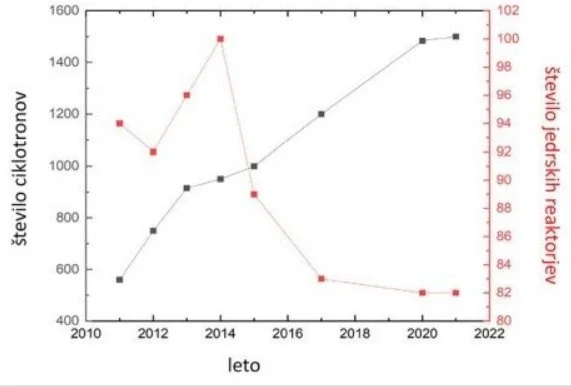The Slovenian partners are working together to establish a centre of excellence for the sustainable production of radioisotopes.
Ljubljana, 28 March 2025 – The Slovenian partnership, led by the Slovenian Academy of Engineering and working with international partners, has successfully obtained funding for the IFIGENEIA European project: an innovative system for isotope generation using an efficient ion accelerator. The project is fully coordinated by the Aristotle University of Thessaloniki in Greece and officially began in March 2025, running for four years. It involves 22 partners from Greece, Slovenia, Cyprus, Germany, Switzerland, and Bosnia and Herzegovina. The total funding for the four-year project is €6 million.
Slovenian Innovation Ecosystem
The project will be implemented at the Faculty of Medicine at the University of Ljubljana, in collaboration with experts from the University Clinical Centre of Ljubljana, the Jožef Stefan Institute, and Cosylab d.d. The Slovenian Academy of Engineering and SIS EGIZ will also participate, as will the Strategic Development and Innovation Partnership (SRIP) for Health and Medicine. All key stakeholders in nuclear medicine, medical imaging, radiology, nuclear physics, particle physics, radioisotopes and linear accelerators are expected to be involved in the ecosystem. The Slovenian partners will contribute expertise in accelerator development, radiopharmaceutical research, knowledge transfer, staff training, and preparing strategic and investment plans for project implementation.
The project is given particular weight by the collaboration of some of Europe's most prestigious research institutions, such as the European Organization for Nuclear Research - CERN, the GSI Helmholtz Centre for Heavy Ion Research with its leading accelerator facility FAIR, and the German Cancer Research Centre - DKFZ. Their involvement ensures the highest level of scientific excellence, technological advancement and international networking, making IFIGENEIA one of the most important projects in the development of a sustainable infrastructure for radioisotope production in Europe.
Key objective: sustainable radioisotope production in the region
IFIGENEIA addresses the pressing shortage of locally available radioisotopes, which are key to modern diagnostics and treatment of cancer, cardiovascular and neurological diseases such as Alzheimer's and Parkinson's diseases. While around 20 million nuclear medicine procedures are performed annually in the US, Europe lags behind due to a lack of specialised infrastructure. This is particularly true in the Balkan region, where high costs and technological constraints inhibit access to appropriate solutions.
Radioisotopes are the components of radioactive drugs used in nuclear medicine for diagnosis and treatment. The main sources of these isotopes are reactors and cyclotrons, which combine to provide a comprehensive diagnostic and therapeutic treatment of the patient. Due to the explosive development of radioactive drugs, we are currently facing a global shortage of radioisotopes produced in nuclear reactors, which represents one of the key challenges in the management of patients in nuclear medicine (Figure).
To this end, the project will set up three Centres of Excellence in Slovenia, Greece and Cyprus, and train BiH experts to work together on an equal footing. The centres will focus on the development of advanced infrastructure for the sustainable and safe production of radioisotopes. The main technological solution of the project is based on the Linear Accelerator in Phase (LINAC), a compact, affordable and environmentally friendly alternative to traditional nuclear reactors.
A multifunctional infrastructure with a long-term impact for Slovenia
The project will allow, through a comprehensive feasibility study, the progressive development of LINAC technology in each of the participating countries, contributing to increased security of supply, greater European sovereignty in the field of medicines and greater access to treatment for patients.
In the initial phase of development, LINAC will function as a multi-purpose centre for industrial applications, cultural heritage studies, clinical research and university education. In a later phase, the technology will be upgraded for use in cancer treatment, with long-term benefits for the healthcare system, research and the economy.
Strengthening the European Research Area and Slovenia's strategic role
In addition to direct technological impacts, the project will strengthen international cooperation, contribute to knowledge transfer and the development of new solutions, and strengthen regional innovation ecosystems. By aligning activities with smart specialisation strategies at national and regional level, IFIGENEIA will contribute in the long term to the development of scientific excellence and competitiveness in Europe in the field of nuclear medicine.
For Slovenia, IFIGENEIA represents a strategic opportunity to strengthen its role on the European research and innovation map and an important step towards more accessible, efficient and sustainable diagnostics and treatment for Slovenian patients.
For more information:
prof. dr. Stane Pejovnik
Slovenian Academy of Engineering
E-mail: info@ias.si
Translated by Deepl.

